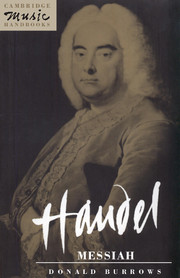Book contents
- Frontmatter
- Contents
- Preface
- References to ‘Messiah’ editions
- 1 The historical background
- 2 From composition to first performance
- 3 The first London performances
- 4 Revival and revision, 1743–1759
- 5 Messiah in other hands
- 6 Design
- 7 Individual movements
- 8 Handel's word-setting
- Appendix 1 The libretto of Messiah
- Appendix 2 Messiah sources
- Notes
- Bibliography
- Index
1 - The historical background
Published online by Cambridge University Press: 05 June 2012
- Frontmatter
- Contents
- Preface
- References to ‘Messiah’ editions
- 1 The historical background
- 2 From composition to first performance
- 3 The first London performances
- 4 Revival and revision, 1743–1759
- 5 Messiah in other hands
- 6 Design
- 7 Individual movements
- 8 Handel's word-setting
- Appendix 1 The libretto of Messiah
- Appendix 2 Messiah sources
- Notes
- Bibliography
- Index
Summary
Messiah was composed within the specific genre of English theatre concert oratorio that Handel himself had developed. Its historical and artistic background can therefore be understood without extended examination of the problems of semantics and categorisation that surround the word ‘oratorio’. However, a brief consideraton of the genre is desirable because Handel encountered, and composed music for, various oratorio-type works before embarking on his English theatre oratorios. While any influences from these earlier experiences must have been fully absorbed before he composed Messiah, the other traditions may nevertheless have contributed something significant to his decisions about the musical treatment of particular sections. Moreover, the oratorio genre incorporated features that could in certain circumstances produce a conflict between creative expression and social acceptance. In Messiah, the artistic and practical issues were focused in their sharpest form, and critically affected the work's initial reception.
Oratorio was created by the application of theatrical musical techniques to a sacred story. While the idea of dramatic presentation of sacred subjects, with or without any musical component, was not new – it was one clear strand of medieval theatre – oratorio itself was a ‘twin’ creation with opera in Italy at the beginning of the seventeenth century. The first significant landmark, Emilio Cavaliere's Rappresentatione di Anima, et di Corpo (‘The Representation of the Soul and the Body’), first performed and published in Rome in 1600, was staged and semi-acted in a consecrated building rather than a public theatre; but it was not undertaken within any liturgical framework.
Information
- Type
- Chapter
- Information
- Handel: Messiah , pp. 1 - 7Publisher: Cambridge University PressPrint publication year: 1991
